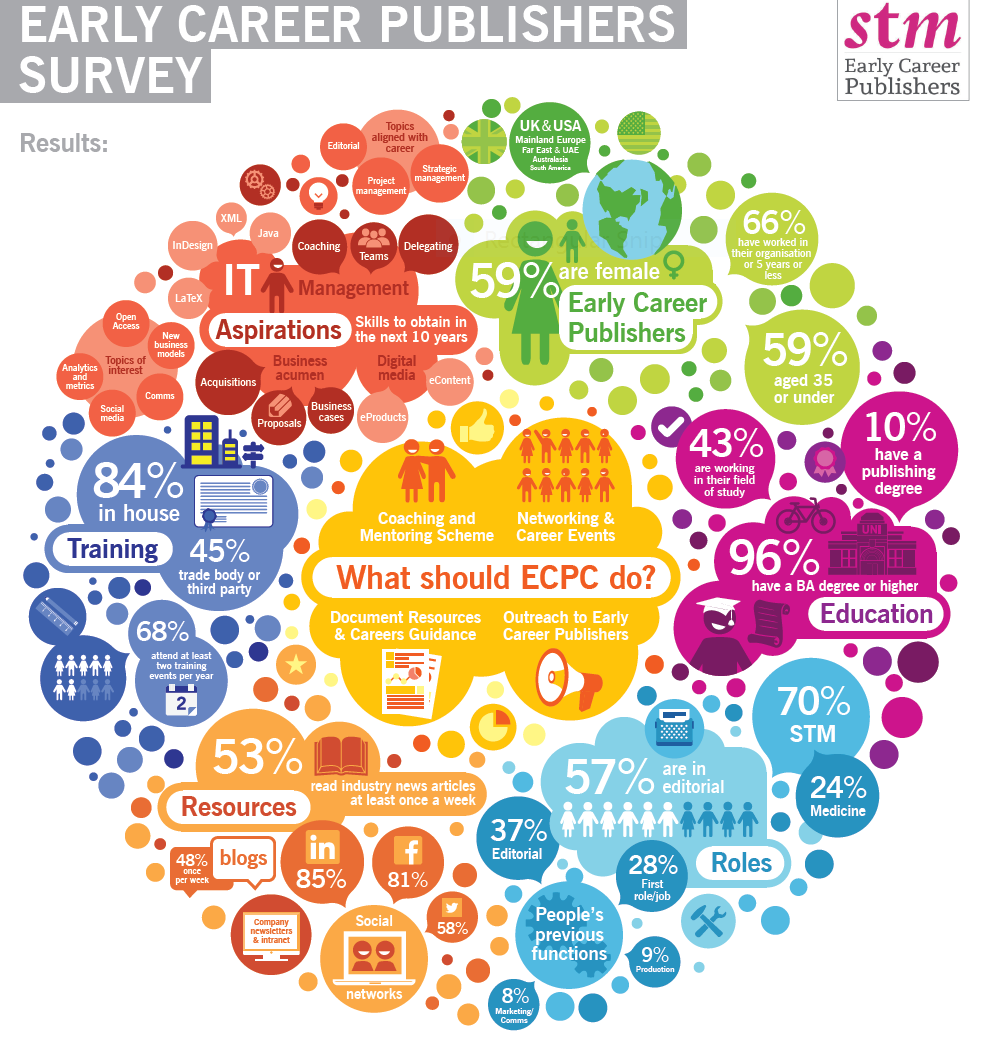 This year the opening plenary session at the SSP Annual Meeting is being co-organized by the SSP Professional Development Committee (PDC) and the STM Early Careers Publishing Committee (ECPC). The session will highlight the early career mentoring activities of both organizations and is intended to spark discussion with the panelists and the audience.
This year the opening plenary session at the SSP Annual Meeting is being co-organized by the SSP Professional Development Committee (PDC) and the STM Early Careers Publishing Committee (ECPC). The session will highlight the early career mentoring activities of both organizations and is intended to spark discussion with the panelists and the audience.
That’s where you come in! But first…some background.
SSP: For several years, the SSP has managed a Travel Grant program where individuals submitted applications for a limited number of free Annual Meeting conference registrations as well as travel support. Starting with the 2016 Annual Meeting, this program has evolved into the Fellowship Program, extending its benefits and support beyond the boundaries of the SSP Annual Meeting. The Fellowship Program includes multiple training and career development opportunities, networking events and community forums, individualized advice and guidance through mentorship, and the ability to play a role in furthering SSP’s goals through committee service.
With almost 100 Fellowship applications submitted for the 2016 program, PDC members had a difficult time judging and selecting the twelve 2016 SSP Fellows. The popularity of the program made it very clear that there is a need and interest in a wider mentoring initiative. To that end, the SSP has recently launched a process whereby individuals can apply for mentorship.
STM: In 2014, ECPC conducted a survey to see what early career publishing professionals most wanted from the committee. Following c. 600 responses, 4 areas emerged as key work streams: Mentoring, Career Development Resources, Outreach, and Engagement. Focusing on mentoring, the ECPC was charged with the development and administration of an STM mentoring scheme pilot, with the development of accompanying mentoring webinars.
A cross-publisher pilot was launched in spring 2015 via social media and word of mouth. To ensure the pilot was manageable, the ECPC decided to limit the numbers and ended up with approximately 22 pairings (although the demand was far greater). The pairs were matched based on their interests, but also the competencies they wished to develop in summer 2015. The initial pilot has been 6 months long, and a review meeting will occur in the next few weeks.
STM is keen to continue this program with another wave of mentor/mentee pairings. Anyone interested in becoming part of the program should contact Laura Wilson from Emerald, the contact person for STM-ECPC mentoring.
So how is this an Ask the Chefs post?
The SSP plenary session is going to focus on questions and discussion topics both submitted in advance and arising during the question and answer period. We asked the Chefs:
What should we discuss during the SSP mentoring plenary?
Here’s what they had to say –
Kent Anderson:
How much does luck or serendipity play a role in careers?
Rick Anderson:
Looking back on the early months/years of your career, were there strategic mistakes you made that could have been avoided if someone had given you the right heads-up?
Joe Esposito:
What is the path in academic publishing that is likely to create the greatest amount of wealth for an individual?
Charlie Rapple:
What 2-3 activities do you feel were game changers in terms of your career taking off? (e.g. a committee you got involved with, an event where you met people)
How valuable are professional qualifications that you might undertake along the way?
Did everyone on the panel have to put in extra hours to ensure their personal professional development?
David Smith:
Would the Scholarly Publishing World (all constituents!) benefit from a formal system of Compulsory Professional Development? One ultimately with accreditation and certification etc?
If yes, why? and how wide should the CPD space stretch?
If no, why not? Other industries have this.
Alison Mudditt:
What advice do you have for ambitious women in their early careers to help them navigate the well-documented, unconscious biases that exist for women leaders?
Robert Harington:
What are the best ways to feel out company culture?
How do I best balance the needs of my company and the needs of my author/editor?
What are the core competencies for the position of Publisher?
Alice Meadows:
What one skill or quality is most likely to ensure a successful career in scholarly publishing and why?
Phill Jones:
When the STM-ECPC launched their first round of mentoring partnerships, they had more applications from mentees than mentors. From what I’ve heard though, the mentors have given even more positive feedback that the mentees have. Perhaps mentors benefit more than we realize. I’d be interested to learn more about what mentors have gotten out of the relationships.
Programs so far have been relatively small, despite there being a sense that a lot of people would like to participate in mentorship programs. Do we need to really scale things up and if so, how do we do that?
___________________________________________________
Now, what do you think?
Do any of the questions or topics above resonate with you and your experiences? Do you have other questions or topics that we should discuss during the plenary?
Let us know.
And, if you haven’t registered for the SSP Annual Meeting, please come and join us in Vancouver. It’s going to be a phenomenal meeting!
Discussion
3 Thoughts on "Ask The Chefs: What Should We Discuss During The SSP Mentoring Plenary?"
I never understood publishing until I understood the financial side of the business. There is more to publishing than the spreadsheet most learn.
Much mentorship happens in a very informal way, a helpful colleague sharing advice or a thoughtful manager who wants to see someone succeed. Often mentors don’t even realize they are thought of in that way. What is the best way for an ECP to approach a potential mentor about making the relationship more formal (or at least more consistent)?


